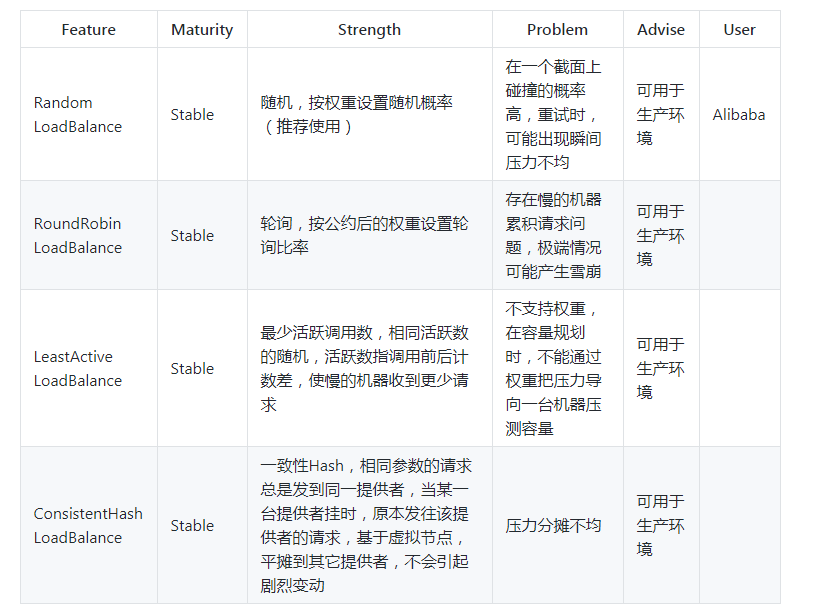dubbo学习(八)负载均衡
概述
在上一节我们将集群的时候,最后的 invoker 又 负载均衡的 select 方法选出,我们先来看一下上一节设计到负载均衡的代码, AbstractClusterInvoker 类 :
private Invoker<T> doSelect(LoadBalance loadbalance, Invocation invocation,
List<Invoker<T>> invokers, List<Invoker<T>> selected) throws RpcException {
if (CollectionUtils.isEmpty(invokers)) {
return null;
}
if (invokers.size() == 1) {
return invokers.get(0);
}
// 调用 loadbalance 的 select 方法
Invoker<T> invoker = loadbalance.select(invokers, getUrl(), invocation);
...
}
这里先给出几种负载均衡模式的实现优缺点 。
我们来分析一下几种负载均衡实现过程。
AbstractLoadBalance 父类分析
public abstract class AbstractLoadBalance implements LoadBalance {
/**
* Calculate the weight according to the uptime proportion of warmup time
* the new weight will be within 1(inclusive) to weight(inclusive)
*
* warmup : 预热时间
*
* @param uptime the uptime in milliseconds
* @param warmup the warmup time in milliseconds
* @param weight the weight of an invoker
* @return weight which takes warmup into account
*/
static int calculateWarmupWeight(int uptime, int warmup, int weight) {
int ww = (int) ( uptime / ((float) warmup / weight));
return ww < 1 ? 1 : (Math.min(ww, weight));
}
@Override
public <T> Invoker<T> select(List<Invoker<T>> invokers, URL url, Invocation invocation) {
if (CollectionUtils.isEmpty(invokers)) {
return null;
}
if (invokers.size() == 1) {
return invokers.get(0);
}
return doSelect(invokers, url, invocation);
}
protected abstract <T> Invoker<T> doSelect(List<Invoker<T>> invokers, URL url, Invocation invocation);
/**
* Get the weight of the invoker's invocation which takes warmup time into account
* if the uptime is within the warmup time, the weight will be reduce proportionally
*
*
* 这里计算权重的时候,核心就是 uptime/warmuptime 的占比,可以知道当开始启动的时候,uptime 较小占比小于是权重就小
* 当启动久了占比就大了,权重自然就大了。
*
* @param invoker the invoker
* @param invocation the invocation of this invoker
* @return weight
*/
int getWeight(Invoker<?> invoker, Invocation invocation) {
int weight;
URL url = invoker.getUrl();
// Multiple registry scenario, load balance among multiple registries.
if (REGISTRY_SERVICE_REFERENCE_PATH.equals(url.getServiceInterface())) {
weight = url.getParameter(REGISTRY_KEY + "." + WEIGHT_KEY, DEFAULT_WEIGHT);
} else {
weight = url.getMethodParameter(invocation.getMethodName(), WEIGHT_KEY, DEFAULT_WEIGHT);
if (weight > 0) {
long timestamp = invoker.getUrl().getParameter(TIMESTAMP_KEY, 0L);
if (timestamp > 0L) {
long uptime = System.currentTimeMillis() - timestamp;
if (uptime < 0) {
return 1;
}
// 默认的预热时间是 10 分钟
int warmup = invoker.getUrl().getParameter(WARMUP_KEY, DEFAULT_WARMUP);
if (uptime > 0 && uptime < warmup) {
weight = calculateWarmupWeight((int)uptime, warmup, weight);
}
}
}
}
return Math.max(weight, 0);
}
}
RandomLoadBalance
@Override
protected <T> Invoker<T> doSelect(List<Invoker<T>> invokers, URL url, Invocation invocation) {
// Number of invokers
int length = invokers.size();
// Every invoker has the same weight?
boolean sameWeight = true;
// the weight of every invokers
int[] weights = new int[length];
// the first invoker's weight
int firstWeight = getWeight(invokers.get(0), invocation);
weights[0] = firstWeight;
// The sum of weights
int totalWeight = firstWeight;
for (int i = 1; i < length; i++) {
int weight = getWeight(invokers.get(i), invocation);
// save for later use
weights[i] = weight;
// Sum
totalWeight += weight;
if (sameWeight && weight != firstWeight) {
sameWeight = false;
}
}
if (totalWeight > 0 && !sameWeight) {
// If (not every invoker has the same weight & at least one invoker's weight>0), select randomly based on totalWeight.
int offset = ThreadLocalRandom.current().nextInt(totalWeight);
// Return a invoker based on the random value.
// 循环让 offset 数减去服务提供者权重值,当 offset 小于0时,返回相应的 Invoker。
// 举例说明一下,我们有 servers = [A, B, C],weights = [5, 3, 2],offset = 7。
// 第一次循环,offset - 5 = 2 > 0,即 offset > 5,
// 表明其不会落在服务器 A 对应的区间上。
// 第二次循环,offset - 3 = -1 < 0,即 5 < offset < 8,
// 表明其会落在服务器 B 对应的区间上
for (int i = 0; i < length; i++) {
offset -= weights[i];
if (offset < 0) {
return invokers.get(i);
}
}
}
// If all invokers have the same weight value or totalWeight=0, return evenly.
return invokers.get(ThreadLocalRandom.current().nextInt(length));
}
总结
其他类的分析就不再深入了,都是根据均衡算法得出某个 invoker .
参考资料
- http://dubbo.apache.org/zh-cn/docs/source_code_guide/loadbalance.html



 浙公网安备 33010602011771号
浙公网安备 33010602011771号